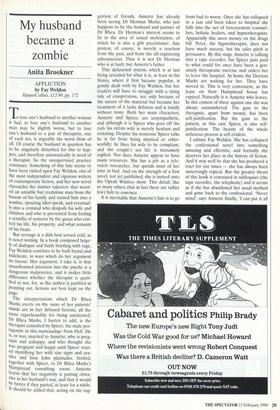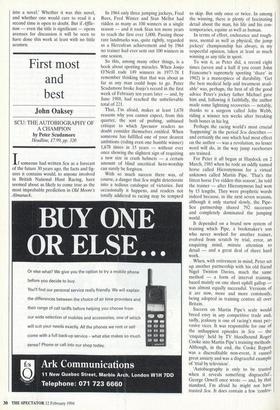My husband became a zombie
Anita Brookner
AFFLICTION by Fay Weldon HarperCollins, £12.99, pp. 172 To lose one's husband to another woman is bad, to lose one's husband to another man may be slightly worse, but to lose one's husband to a pair of therapists, one of each sex, is arguably the worst blow of all. Of course the husband in question has to be singularly disturbed for this to hap- pen, and therefore axiomatically in need of a therapist. So the unsupervised practice continues. Something of this fate seems to have been visited upon Fay Weldon, one of the most independent and vigorous writers of contemporary fiction, and her new novel chronicles the sinister takeover that wrest- ed an amiable but credulous man from the bosom of his family and turned him into a zombie, spouting idiot-speak, and eventual- ly into a criminal who despoils his wife and children and who is prevented from feeling a scintilla of remorse by the gurus who con- trol his life, his property, and what remains of his brain.
But revenge is a dish best served cold, as is novel writing. In a book composed large- ly of dialogue and fairly bristling with rage, Fay Weldon contrives to be both brutal and indelicate, in ways which do her argument no favour. Her argument, I take it, is that unauthorised intrusion into the psyche is a dangerous malpractice, and it makes little difference whether the therapist is quali- fied or not, for, as the author is justified in pointing out, fictions are best kept on the Page.
The interpretations which Dr Rhea Marks erects on the ruins of her patients' minds are in fact debased fictions, all the more reprehensible for being untalented. Dr Rhea Marks, I hasten to add, is the therapist consulted by Spicer, the male pro- tagonist in this marivaudage from Hell. He is, or was; married to Annette, who is preg- nant and unhappy, and who thought she was pregnant and happy until Spicer start- ed mystifying her with star signs and sex- tiles and Iron John platitudes. Invited, together with Spicer, to Dr Rhea Marks's Hampstead consulting room, Annette learns that her negativity is putting obsta- cles in her husband's way, and that it would be better if they parted, at least for a while. It should be added that, acting on the sug-
gestion of friends, Annette has already been seeing Dr Herman Marks, who just happens to be the husband and partner of Dr Rhea. Dr Herman's interest seems to lie in the area of sexual molestation, of which he is also a glib practitioner. Any protest, of course, is merely a reaction from the past, and from the all-registering subconscious. Thus it is not Dr Herman who is at fault, but Annette's father.
This delusional system, which is at last being revealed for what it is, at least in the States, where it first became popular, is grimly dealt with by Fay Weldon, but her readers will have to struggle with a rising tide of exasperation, not only because of the nature of the material but because her treatment of it lacks deftness and is totally without irony. Both her main characters, Annette and Spicer, are unsympathetic, and although it is Spicer who goes off the rails his victim wife is merely hesitant and irritating. Despite the nonsense Spicer talks he is far from being mystical or other- worldly; he likes his wife to be compliant, and the couple's sex life is tiresomely explicit. Nor does Annette appear to have many resources. She has a job as a tele- vision researcher, but spends most of her time in bed. And on the strength of a first novel, not yet published, she is invited onto the Oprah Winfrey show. This detail, like so many others (but in fact there are rather few) fails to convince.
It is inevitable that Annette's fate is to go from bad to worse. Once she has collapsed in a taxi and been taken to hospital she falls into the net of bereavement counsel- lors, holistic healers, and hypnotherapists. Apparently this saves money on the drugs bill. Peter, the hypnotherapist, does not have much success, but his sales pitch is persuasive. By this stage Annette is talking into a tape recorder, but Spicer puts paid to what could for once have been a gen- uinely therapeutic exercise and orders her to leave the hospital. At home the Doctors Marks are waiting for her. They have moved in. This is very convenient, as the lease on their Hampstead house has expired. Naturally it is Annette who leaves. In this contest of three against one she was always outnumbered. The gain to the therapists, apart from money, has been self-justification. But the gain to the patient, in this case Spicer, is also self- justification. The beauty of the whole nefarious process is self-evident.
I admire Fay Weldon. She has collapsed the confessional novel into something amusing and effective, and formally she deserves her place in the history of fiction. And it may well be that she has produced a tract for our times — she has always been unnervingly topical. But the greater thrust of this book is contained in soliloquies (the tape recorder, the telephone) and it seems as if she has abandoned her usual method and gone back to the confessional. 'Never mind', says Annette finally, 'I can put it all
into a novel' Whether it was this novel, and whether one would care to read it a second time is open to doubt. But if Afflic- tion — even the title is significant — opens avenues for discussion it will be seen to have done this work at least with no little acumen.



















































 Previous page
Previous page